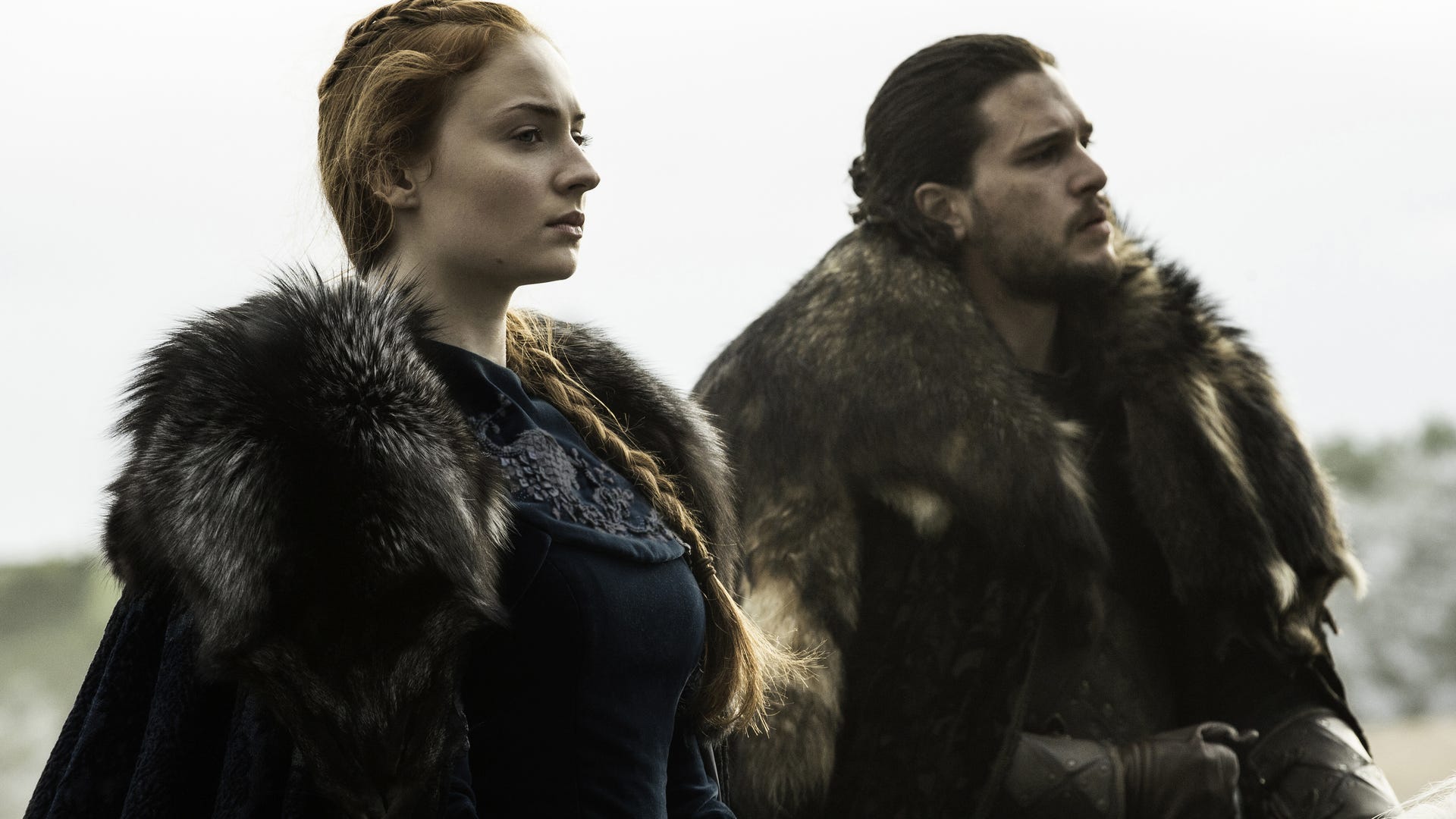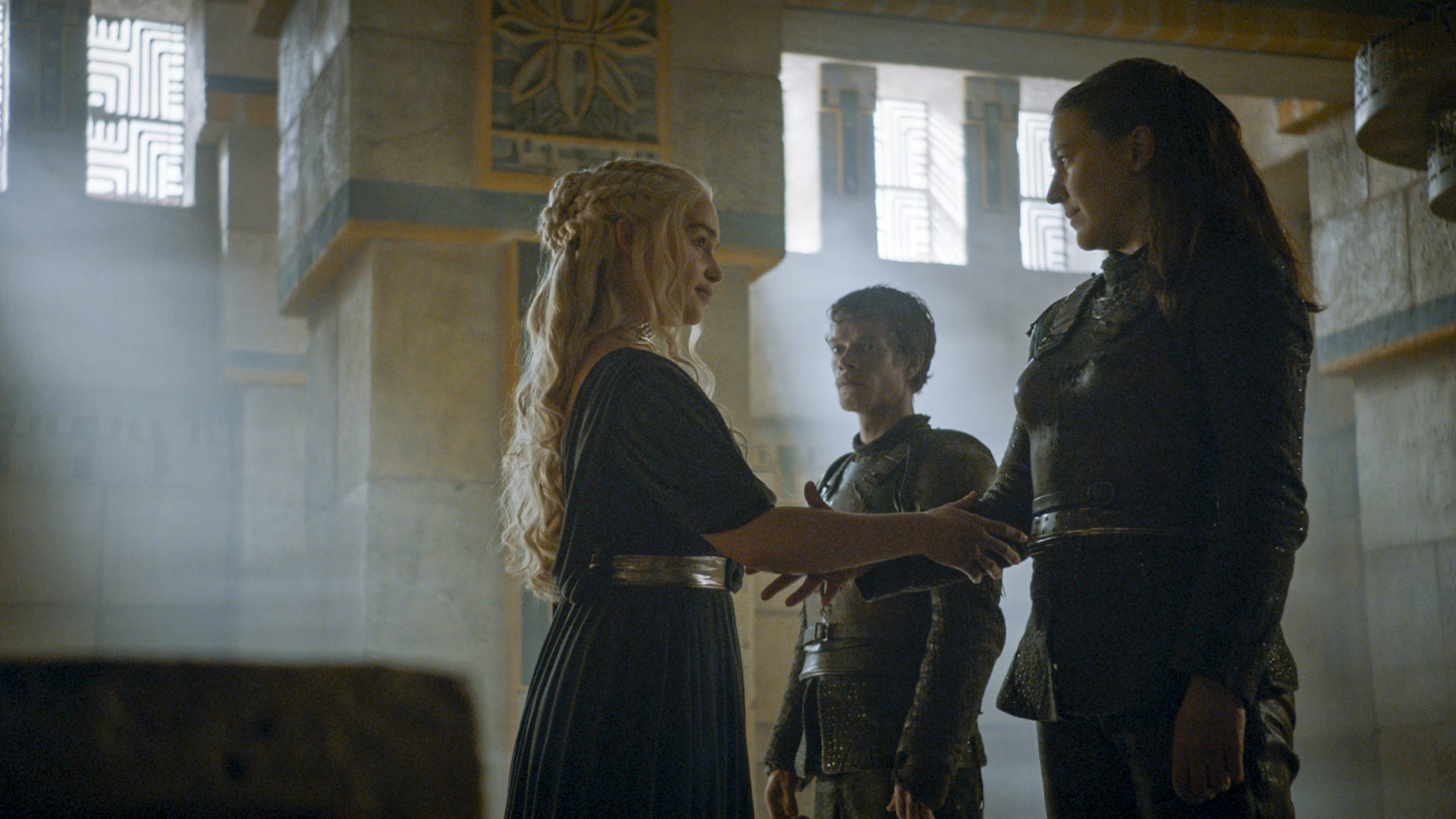Join or Sign In
Sign in to customize your TV listings
By joining TV Guide, you agree to our Terms of Use and acknowledge the data practices in our Privacy Policy.
Game of Thrones Just Revealed Its Endgame
...and it's all about the ladies
Spoilers for this week's Game of Thrones past this point.
What is Game of Thronesreally about? Is it the eternal battle between good and evil? What happens when you try to apply fantasy tropes to the "real world"? Or is it just a show, like actor Ian McShane said, about "tits and dragons"?
In reality it's all of that, but on this week's episode, "The Battle of the Bastards," showrunners and episode writers David Benioff and D.B. Weiss firmly revealed what the show's true plot and thematic endgame is: switching the fantasy world of Westeros from a patriarchy to a matriarchy.
It's not a stunning revelation if you've been watching the show for the past six seasons. There's always been the undercurrent (overcurrent, tbh) of Westerosi women pushing against the male majority. But this season hasn't just set the women up to push back -- they've been toppling it over and taking charge.
And it's about f---ing time.
Game of Thrones has always had a complicated relationship with the female component of the show, and its female audience. Created almost entirely by men (full disclosure: I am also a man), the show has often come under fire for its callous treatment of female characters, as well as massive changes of context from George R.R. Martin's books.
The game is over on Game of Thrones
Mind you, horrible things happen to women in Martin's books, too; but Martin is more of an equal opportunity punisher.
One of the first changes from the books to the screen came when young, exiled future queen Daenerys (Emilia Clarke) was married to a barbarian named Khal Drogo (Jason Momoa). In the books, though Dany is scared on their wedding night, and Khal only speaks one word of her language - "no" - they're able to communicate. He's tender, makes sure she's okay, and they begin to form a loving partnership.
On the show, he rapes her.
From there, the show troublingly followed the same path as the book; but it never sat right that Dany's arc towards self-enlightenment and empowerment began with her violation. It's a path the show has repeatedly followed, from Cersei (Lena Headey) being stripped naked and forced to walk the streets of King's Landing last season so that the full wrath of her fury could be released, to Sansa Stark's (Sophie Turner) violation by her husband Ramsay (Iwan Rheon).

That last arc saw its pay-off this week, as Ramsay was bloodied and beaten by Sansa's half-brother Jon Snow (Kit Harington), then left to Sansa's devices for the final blow. Sansa didn't kill Ramsay with a knife, or an executioner's axe. Instead, she let him be ripped apart by his own hounds... something Ramsay had previously inflicted on multiple characters throughout the past few seasons.
Was it satisfying? Absolutely. Ramsay is one of, if not the most reprehensible characters in the history of the show, so having his face ripped off by dogs, alone in kennel tied to a chair was a "nice" way to go. And Benioff and Weiss made the right move letting Sansa be the one to pull the proverbial trigger, since she - not Jon - was the one directly violated by the Bolton bastard.
In the text of the show, too, it brings Sansa full circle. She started as a ditzy girl living in her parent's home of Winterfell, obsessed with lemon cakes and getting married. Now, her parents are dead and she's (tbd, but come on) the leader of Winterfell, and had her husband torn to shreds by dogs. It's not that subtle a metaphor.
What's troubling is how we've gotten there. Probably more ink has been spilled on Game of Thrones' issues with handling its female characters than blood on the Battle of the Bastards' battlefield, but it stands to be repeated particularly now. It's great that Sansa has completed her arc from flighty young girl to self-aware young woman, but the rape/revenge trope is so over done in TV alone that it's troubling we needed one to get the other.
Elsewhere in the episode, we saw Dany and exiled de facto leader of the sea-obsessed Ironborn Yara (Gemma Whelan) underscore the whole move from patriarchy to matriarchy, in case you didn't catch the subtle drift(wood). Yara comes to Dany pledging ships to help the latter's attempt to take back the throne of Westeros, in exchange for Dany's support in taking back the throne of the Iron Islands (which was stolen by her very male uncle). Dany notes there's never been a queen of the Iron Islands before; to which Yara shoots back that there's never been a queen on the Iron Throne of Westeros before. With a wink and a nod, they seal their alliance, and the Sisterhood of the Traveling Dance With Dragons is born.

Even before this episode, though, we've seen a focus on the women of Westeros standing up and taking charge. Arya Stark (Maisie Williams) took back her birth name and headed home after a several-seasons-long training montage, now a deadly assassin. Queen Margery Tyrell (Natalie Dormer) has used her captivity by religious sect the Sparrows to subtly manipulate her way back into power. And let's not forget pre-teen badass Lyanna Mormont (Bella Ramsey), who is basically everything the show has to say about girl power distilled into a tiny human being.
What's funny about all this is that the Game of Thrones creators, almost to a fault, have refused to admit they did anything wrong with the treatment of their female characters for the past five seasons. Particularly last season during the outcry against Sansa's violation(s), and their seeming lack of follow-up when it came to emotional consequences, the writers and producers dug in and refused to apologize.
Which is 100% their prerogative, it's their show; but this entire season seems like an elongated and over-due apology.
Game of Thrones has lost the ability to surprise
If this is, in fact, their endgame -- taking the world of Westeros and moving the Seven Kingdoms from a rape- and violence-obsessed masculine hell-hole to some sort of matriarchal Utopia -- then it certainly follows the arc Benioff and Weiss have set up. And I'm into it! Yes, let's get a Seven Kingdoms where Sansa is Queen in the North, Yara rules the Iron Islands, Dany is Queen of Everything. It doesn't jell with what Martin has set up in the books, which firmly fall in the realm of "no happy endings"... but very little of Season 6, the first to shy nearly entirely away from the novels the show is based on, feels like Martin's books to begin with.
The troubling part, though, is the path they took to get here. Ultimately, it's satisfying to watch characters who have been brought to their lowest triumph over adversity -- and no characters in the world of Westeros have more adversity to triumph over than the women. But where the male characters have had to triumph over things like nightmare ice creatures, the women have had their development built on an unhealthy diet of violation.
It's far too late in the game (there are reportedly 13 episodes left of the show, spanned out over two seasons) to change direction now, or even create some sort of revisionist history for the base these character arcs are built on. This is the show we have, and the one we'll continue to live with. But when we get the inevitable movie remake in a decade, maybe Sansa can kill the ice demon and Jon Snow can hang out with the rest of the useless, overdone hero boys, twiddling their thumbs and wondering why they don't get as much to do as the women.
